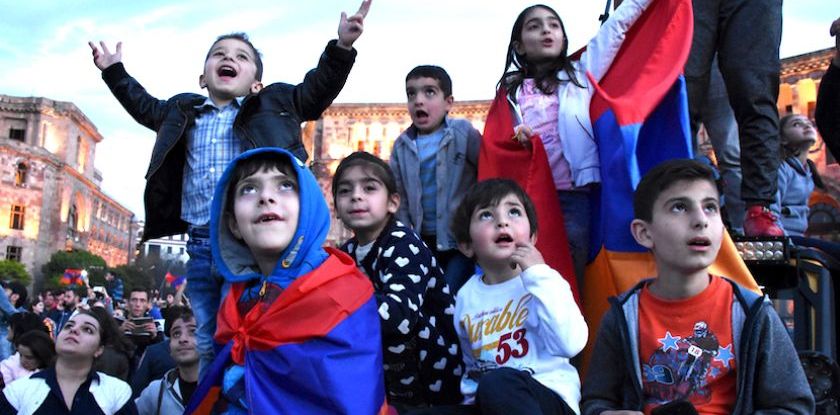In the opinion of political expert Mikael Zolyan, the victory of people’s revolution in Armenia was a result of several factors, the main of which were — lack of popularity of the former president Serj Sargsian, a demand formed in the society, especially among the youth for change, and political maturity of Nikolai Pashinian, leader of the protest, who was able to gather a wide coalition of opposition forces.
April events in Armenia surprised the world. Even when the country was in a full-swing of mass protests acts against the election of the former president Sargsian into a post of prime-minister, non of the experts believed in the success of the revolution. Nonetheless, it won. How was this possible? This was the subject of our talk with Armenian political expert Mikael Zolyan.
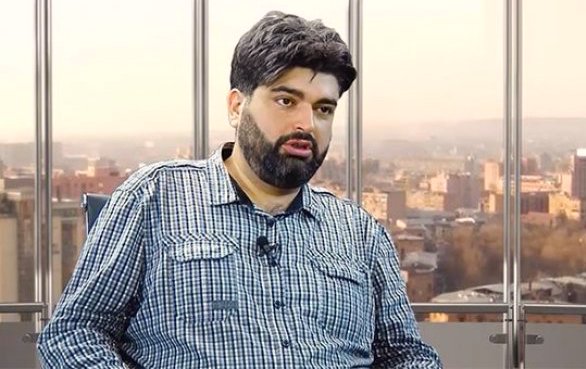
— Mikael, the velvet revolution in Armenia was a bombshell. What, in your opinion has led to its success?
— In Armenia, nobody also expected anything like that. It seemed like Serj Sargsian had all bases covered, opposition was quite weak and people apathetic and disenchanted with politics. But this was just an illusion. Plus there were several other factors that played into revolution.
— What factors?
— First of all lack of Sargsian’s popularity, who was never a charismatic politician, and in 10 years of his rule Armenia wasn’t able to boast economic growth. Sargsian became a symbol of a corrupt system and the atmosphere of despair, which reigned in Armenia throughout the last few years. In that backdrop, his desire to cement his rule, by becoming a president of a parliamentary republic, cause irritation among the people, — he openly promised not to do that but broke his word, showing an indifference to public opinion.
Secondly, a generation of youth has grown on Armenia, who didn’t see their future in the existing system. Not surprisingly it was youth and students who started the protests, which later grew into nation-wide protests.
Third, Nikol Pashinian who was underestimated by many, turned out to be not only a brave and charismatic leaders of the protest, but also a quite mature politician, who was able to gather a wide coalition around him and escape the risks that usually await such processes.
— What methods were used by protesters?
— There were many, but the most effective ones were the blocking of streets and roads. Since it happened in various places at the same time, police didn’t have time. Moreover, participants of the protest instantly scattered, when the situation in some area became too tense, but in a matter of minutes gathered close by. Thus, police couldn’t keep up with a momentary relocation of protest forces, thus their efforts weren’t effective, compared to protestors.
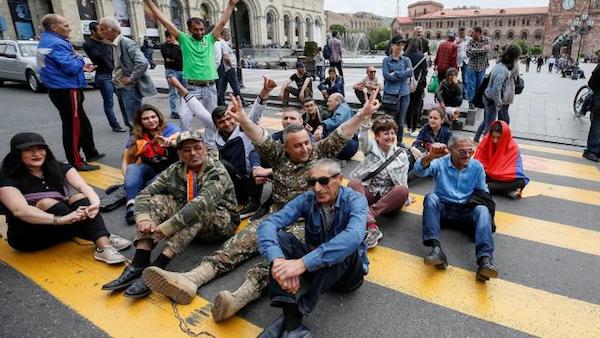
— But it didn’t seem like police was especially rampant? Or is it a false impression?
— Police acted rough. Yes, there were no victims but there were hundreds of arrested people. There was a case when stun grenades were launched directly into protesters group, and several people were hurt.
Police could have employed more severe violence, but it was held back by the fact that participants of the protest didn’t fall for provocations and didn’t even resist arrests. In these circumstances employing of over-the-top actions on part of police would have led to highly negative reaction from the Armenian people, and from the international community.
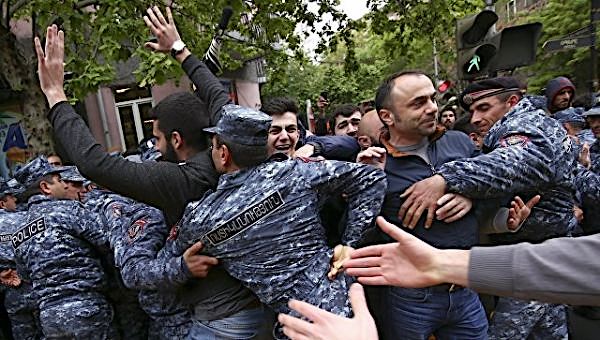
— And nonetheless some observers say that Sargsian could have resorted to the usual method of crackdown on protester for authoritarian countries — by force and weapons, however, he decided not to. Why do you think that was?
— In my opinion, he missed the moment when that was still possible. In the first days of revolution authorities didn’t take the protests seriously, and didn’t bother the protesters. But when Sargsian, came to his senses, there were already thousands of people on the streets, and using violence could have hurt him. But I think that he didn’t leave the thoughts of breaking off the protests with force until the last moment, which is evidenced by his behavior during the talks with Pashinyan, and his following arrest o Apr. 22.
However even more people have come to the streets, now also protesting the arrest of Pashinyan. And it was probably then that Sargsian realized — he will only makes his life harder using violence, and if he admits defeat he will be able to preserve his reputation and political life in Armenia.

— What role, in your opinion, was played by Nikola Pashinyan’s initiative «My move», when he walked from Gyumri to Erevan, organizjng meetings against nomination of Sargsian as the prime-minister on the way?
— I think this initiative, as well as the campaign «Say no to Serj» that was taking place at the same time, were both catalysts. There was a dissatisfaction in society in regards to Sargsian rule, but the people thought there was no hope for changes, there was apathy. And these two initiatives, which later merged into one, became the spark, that later flared up all other processes.

— How do the experts evaluate Nikol Pashinyan as a politician and as a ruler?
— Let’s divide the question. As for the role of politician, Pashinyan has a lot of experience, he was in opposition to Sargsian’s regime since at least 2007, and has grown a lot since then, gained an ability for compromises and pragmatism, which young Pashinyan lacked, but at the same time he didn’t lose a gift of being a charismatic politician, a street leader.
As for the role of managing of a government system, of course Pashinyan didn’t have a chance to gain it; but as the last months showed, he learns fast.
— In your opinion, what steps Pashinyan can and must take, in order to break the system existing in Armenia?
— There are two stages here. First of all, under Serj Sargsian the corruption had a centralized character, with a clear hierarchy from top to bottom — from the highest figures in power down to a regular policeman or customs officer. The coming of Pashinyan to power and appointment of new officials to key positions already laid a foundation to uncovering of corrupt systems.
But in order for this effect to be long-term, there must be secondary serious reforms of the system of government administration, which can be conducted only after special (parliamentary) elections. They are one of Pashinyan’s priorities.
But there are difficulties on that path — the Republican party of Armenia, whose leader is still Sargsian, has a majority on current parliament, thus, its in its interest to postpone the election announcements.
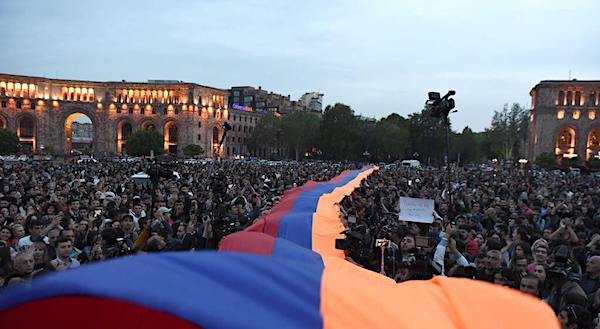
— Today, Pashinyan has a lot of goodwill, but as we think, in order to transform the system he will have to go for unpopular reforms. In that case, is there a risk of repeating of situation in Georgia, when reformers conducted reforms, that radically changed the country for the better, but ended up in a loss themselves?
— Of course, there is risk, and high expectations may easily lead to disappointment. But I think it will be different for Pashinyan, compared to reformers in Georgia. It will be easier because, first of all, he will consider their experience, and secondly, in at the time Georgia ended up in a much worse situation. It was practically a failed state — in which government machine didn’t work. There is no such situation in Armenia, our government machine works, it doesn’t have to be built from nothing. But, on the other hand, this circumstance may make Pashinyan’s life harder, since there is still a strong previous influence in the government system.
— What risks do you see for the young revolution and its achievements? What can be expected from Azerbaijan? Can the relations with Russia worsen and why?
— There are threats both internal and external. The main internal one — is the attempt of retaliation by the republicans, who still largely obey Serj Sargsian. They probably won’t be able to come to power again, at least in the foreseeable future, but they can make life very difficult for the new government — torpedo reforms, create inner instability.
The outside threat, is of course related to Karabakh conflict. If the transitional period within Armenia gets prolonged, it can tempt Baku to change the balance in the zone of conflict by force.
As for relations with Russia, everything is fine for now. But there is a lot of work to be done in that sphere. There is a lot of distrust towards Pashinyan and his team in Moscow, and many consider him a «westerner». In order to be fair, I must note that Sargsian wasn’t trusted in Kremlin either, since they thought that he plays both sides — in the Moscow and European direction.
Pashinyan still has to find the right balance in relations with Moscow — find the line that will allow him to defend interests of Armenia, without corssing the red line, which can drive a wedge with Kremlin. And possibly, he will benefit from his colleagues in EAEU’s experience of building relationships with Moscow.
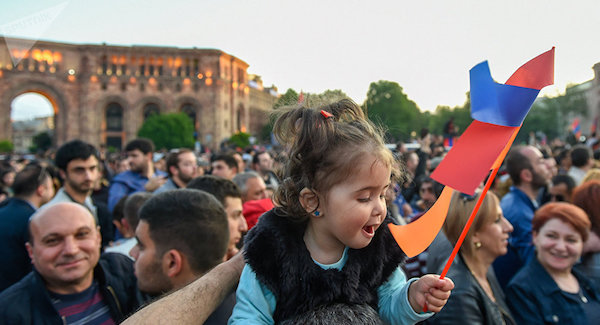
— As many experts have noted, in Armenia, during the days of revolution there was a sense of unity of people in their aspiration to change the country, and the protests themselves, especially in the last days before the victory of revolution, looked like a national holiday. What inspired people so much?
— I think people just believed in the possibility of changes. Yes, Sargsian was very unpopular, he became the symbol of a corrupt system, economic and social degradation. There was a depressive atmosphere in Armenia in the last few years. And the people, when going out to protest, not only expressed protest, but also tried to change this atmosphere, riding it from despair. Thus, the festive spirit that was felt on the streets of Armenia even when there was still a long way to go until the triumph of revolution.
— Thank you for the interview.

